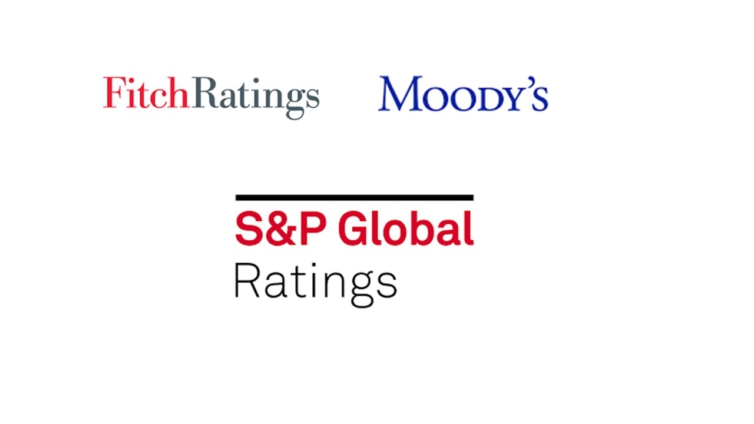There is no evidence from both quantitative and qualitative data review that rating agencies, S&P, Moody’s and Fitch, have been reckless in downgrading the Ghanaian economy 11 times last year, findings of a research by Dr. Richmond Atuahene and K.B Frimpong has disclosed.
According to the report, Ghana has a record of political stability and strong economic growth in the past, it has been wrestling with escalating inflation, a falling currency and a stubborn high budget deficit, among others.
“From the varying S&P, Moody’s, and Fitch ratingmethodologiesshowed that the country was experiencing of dwindled foreign exchange reserves; persistent depreciation of the local currency against major trading currencies like US dollar, Euro and UK pound sterling; high inflation; high fiscal deficit; current account deficits; high debt servicing obligations; the lack of the access to capital markets; shortfall in government revenues and an increase in expenditures associated with the pandemic; over-bloated government expenditures and the weakened economy which clearly allowed Ghana to be classified as default”.
It explained that S&P, Moody’s and Fitch all have defined default as failure to pay a material sum of interest or principal on a debt instrument on its due date as well as a debt restructuring conducted in a manner deemed to be coercive, involuntary, and distressed.
Due to this, the three rating agencies were not reckless in downgrading the Ghanaian economy.
The global credit rating agencies have been criticised by President Akuffo-Addo as reckless in their downgrades of the economy after the country defaulted on its debt obligations.
The research identified that the three agencies have been conducting risk ratings of the economy as far back as 2003 and have been issuing some positive results for bonds issued on the international capital markets. For instance, the $750 million bond issued in 2007 was four times oversubscribed.
Rating agencies integral part of modern capital markets
It furthered that credit rating agencies have been an integral part of modern capital markets and their assessments on sovereign entities have been increasingly used as benchmarks by regulators and global investors.
“International credit rating agencies play a role in global financial markets by helping to reduce the information asymmetry between Government of Ghana and investors, on one side and issuer on the other side about the creditworthiness of country since 2007. All bonds issued including Ghana’s debut bonds have risk rated either B+, or BB- and BB+ by Fitch, Standard and Poor’s or Moody’s. The successful issuance of the various bonds was testament to investors renewed confidence as well as the positive ratings by three credit rating agencies”.
Low economic growth, rising debt must be addressed
In conclusion, the report said Ghana has experienced low economic growth and this situation coupled with poor governance has resulted in a rapid increase in government debt over the past five years with a debt to Gross Domestic Product ratio of nearly 100%.
“Low economic growth and rising government debt are two key factors for risk ratings agencies and after two years of these conditions, it was no surprise that the sovereign risk rating was adjusted to sub-investment levels. This led to an outflow of capital from the country and domestic firms held back investments due to policy uncertainty especially with the recent domestic debt exchange”, it added.
It therefore urged government to clear all policy uncertainty as a matter of urgency, since this will encourage domestic firms specifically to invest in the economy, adding, government must accelerate economic growth to aid taxes collection as well reduce its appetite for borrowing.
“Economic growth and investment need to be stimulated to revive its government debt position and return its credit ratings to investment grade. By achieving investment-grade ratings, will increase investment inflows into Ghana, thus putting the government in a position where its economic conditions will improve. Key strategies need to be developed and directed towards various investment in the agricultural sector and development projects like road networks, railway systems and incentives, both domestically and internationally, to improve the country’s sovereign credit rating”.
Latest Stories
-
IMANI Africa takes on EC, accuses it of lying and publishing half truths
35 mins -
Manasseh Azure calls for investigation and prosecution of those responsible for GRA/SML contract
45 mins -
Kwesi Atuahene: Ghana’s health capital depends on HealthTech – Africa Center for Digital Transformation
1 hour -
13 signs your wife is planning on leaving you and you have no idea
1 hour -
IMANI Africa: Ghana’s EC’s dangerous and pathological conduct
2 hours -
If I speak there will be fire – Salah on Klopp row
2 hours -
Grieving after divorce is normal, but this particular kind of grief isn’t
2 hours -
10 beautifully unexpected ways husbands proposed to their wives
2 hours -
Reality zone with Vicky Wireko: Painting Ghana purple: Be aware, May is month of mental health awareness
2 hours -
Prof Opoku-Agyemang’s integrity is admirable – Inusah Fuseini
3 hours -
Your reign has been a beacon of wisdom – Alan Kyerematen tells Asantehene
3 hours -
Akufo-Addo’s driver wins La Dadekotopon NPP primary
3 hours -
Education Minister must channel resources to rebrand basic public schools into tackling critical needs – Minority
3 hours -
CAFCC: “Dreams need to score early to unsettle Zamalek” – Former Zamalek striker Felix Aboagye
4 hours -
GHS launches mobile app to counter misinformation about vaccines
4 hours

